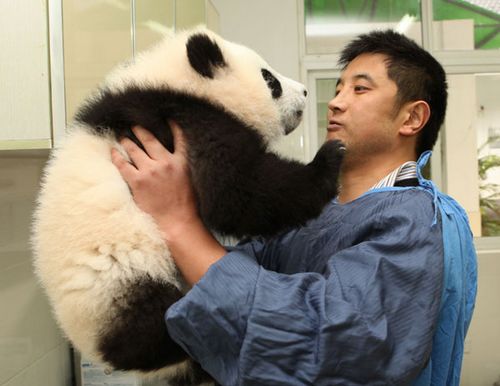
(Ecns.cn)--Two hairy Chinese "ambassadors" arrived in Britain at the end of 2011. Big fans of bamboo, one is called Tian Tian (female) and the other Yang Guang (male), and both are now on a decade-long lease to Edinburgh Zoo.
The pair are the most recent example of China's attempt to reinforce its international relationships by lending pandas to foreign zoos, pointed out The National, the Abu Dhabi Media Company's first English-language publication.
For over half a century, dozens of pandas have been sent abroad as gifts, loans or cooperative subjects.
Dubbed "panda diplomacy" by foreign reporters, the practice is hardly new, with the tradition of panda gifting dating back to China's Tang Dynasty (618 AD to 907 AD). It was in 685 AD that the empress Wu Zetian sent a pair of the ursine creatures to soften up her Japanese counterpart.
In 1957, Ping Ping and An An were given to the Soviet Union in an effort to mark the 40th anniversary of the Bolshevik October Revolution (1917). From 1965 to 1980, five pandas went to the Democratic People's Republic of Korea (DPRK).
Ling Ling and Xing Xing might be one of the most famous pairs. They were given to the U.S. to commemorate the easing relations between the two countries after then-President Richard Nixon's ice-breaking visit in 1972.
So phenomenally popular were the bears that more than a million visitors saw them at the Washington National Zoo during their first year in residence, reported The National.
Statistics show that by 1982, 24 pandas had been given to countries including the U.K., the U.S., Japan, Australia and Mexico, where they all enjoyed great popularity.
Yet this year a change in policy has made panda diplomacy a more short-term game: instead of giving the bears away, China has decided to lend them out for designated periods.
In 1984, the U.S. borrowed two bears at a high price for three months as the Olympic Games opened in Los Angeles, which sparked a series of commercial uses for the globe-trotting pandas.
However, frequent tours abroad cause pandas to clock up a considerable number of air miles over their lifetimes (typically 20 years, but as much as 30 in captivity), which may result in physical and psychological disorders, so the practice was called off in the mid-1990s, revealed The National.
A "Giant Panda Cooperation and Research Project" was introduced later, which, according to the Convention on International Trade in Endangered Species of Wild Fauna and Flora, allows foreign zoos to borrow pandas on a ten-year lease at $1 million each per year. All cubs bred during the period of a lease will belong to China, and the zoos should be responsible for protecting the animals.
The joint research program started in Japan from 1994, when the panda couple Mei Mei and Yong Ming arrived in western Japan's Wakayama prefecture.
Now a new pair of pandas—Xian Nu and Bi Li—have been loaned to Tokyo's Ueno Zoo since February 22, 2011, raising hopes that the animals may help improve bilateral ties and attract more visitors to the park since Ling Ling's death in 2008. Japan will pay China $9.5 million in total for having them over the next 10 years, said China.org.cn.
An American scholar analyzed that pandas have become a cherished symbol of national identity, and play an important role in developing and improving relationships between China and the world.
"They're pudgy, hairy and spend all day eating lunch. Yes, pandas make the perfect diplomats," commented the New Zealand Herald.
Speaking of the panda research program between China and the Edinburgh Zoo, the Financial Times interpreted that these are good signs from China, which may be a reliable support for Europe during its debt crisis.
Panda diplomacy—for China, they represent the country's ultimate gift—was part of a charm offensive that also included an easing of restrictions on tourism and agricultural imports, added the Guardian.
Bruce, an Edinburgh local, said that the pandas mark a new stage in the Sino-UK relationship.
However, some conservationists fear China's desire to foster good international relations jeopardizes the pandas' welfare. Libby Anderson, of the animal-protection charity OneKind, said: "No matter how high the quality of their new enclosures, no matter how excellent the viewing and monitoring facilities, the pandas inside will still be denied the ability to roam free, to forage and feed as they like, to avoid or associate with companions, and to follow their instincts in selecting a mate."

Copyright ©1999-2011 Chinanews.com. All rights reserved.
Reproduction in whole or in part without permission is prohibited.